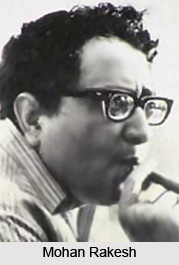 Mohan Rakesh was a famous Hindi playwright of India. But he was popularly recognized as an author of fiction. Mohan Rakesh was born in Amritsar, Punjab in 1925. His family background was somewhat conservative. He completed postgraduate degrees in Sanskrit and Hindi, and started writing short stories at an early age. He edited a literary journal, Sarika, for some time. After a few stints at teaching he took up freelancing as a profession because by temperament. He was a rebel and wanderer. His small body of plays can be mentioned as Ashadh ka ek din i.e. `One Day in Ashadha` published in 1958, Lahron ke rajhans or `Swans of the Waves`, Adhe-adhure and the unfinished Pair tale ki zamin or `Ground Beneath the Feet`. Though his plays he brought a completely new sensibility to the realistic genre. Thematically, his primary interest lay in human relations. He focused on sexuality in the contexts of conflict within a creative artist in Ashadh, conflict between material and spiritual in Lahron, and fast-changing values of middle-class urban life in Adhe-adhure. However, in all these he emphasized a restless search, clearly a manifestation of his own life experience. He always stressed in meaningful relationships beyond existing social norms, creative expression without compromises, and stability without losing one`s self.
Mohan Rakesh was a famous Hindi playwright of India. But he was popularly recognized as an author of fiction. Mohan Rakesh was born in Amritsar, Punjab in 1925. His family background was somewhat conservative. He completed postgraduate degrees in Sanskrit and Hindi, and started writing short stories at an early age. He edited a literary journal, Sarika, for some time. After a few stints at teaching he took up freelancing as a profession because by temperament. He was a rebel and wanderer. His small body of plays can be mentioned as Ashadh ka ek din i.e. `One Day in Ashadha` published in 1958, Lahron ke rajhans or `Swans of the Waves`, Adhe-adhure and the unfinished Pair tale ki zamin or `Ground Beneath the Feet`. Though his plays he brought a completely new sensibility to the realistic genre. Thematically, his primary interest lay in human relations. He focused on sexuality in the contexts of conflict within a creative artist in Ashadh, conflict between material and spiritual in Lahron, and fast-changing values of middle-class urban life in Adhe-adhure. However, in all these he emphasized a restless search, clearly a manifestation of his own life experience. He always stressed in meaningful relationships beyond existing social norms, creative expression without compromises, and stability without losing one`s self.
Unusually, Mohan Rakesh was very conscious of the distinct demands of dramatic language. His words are not the chief medium of communication and a great deal must be left unsaid to which the performer gives meaning. He remained preoccupied with its use in terms of images, sounds, pauses, suggestiveness, incomplete sentences, and other dimensions, which he explored through his short Bij natak or `seed plays` while preparing for full-length drama. Each of his major works he set in a different historical frame, milieu, and class, to challenge himself to create a separate idiom, rhythm, and ambience.
His most important contributions were the new awareness of and parameters for dramatic speech that he evolved. He also achieved a remarkable crispness and theatricality in his writing through a conscious effort to collaborate closely with eminent actors and directors, revising scripts according to their observations in order to grasp the nuances of the performatory language. This resulted in more than one version of the plays. As for example Lahron substantially changed during Shyamanand Jalans production in 1967.
Rakesh`s novels and short stories, like his dramas, examine relationships and question societal norms and ethical codes. His diary, which is a sensitive personal document, helps to understand his central concerns. He remains the most performed playwright of Hindi theatre and the one who most influenced dramatists of his generation and afterwards. His plays have been staged in translations all over India and abroad. He also composed radio drama and poetry. Mohan Rakesh died in 1972.




















